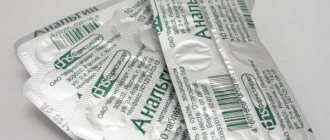The choice of drug therapy during pregnancy is extremely important. After all, the list of contraindications in the annotation for any drug almost always begins with the words “do not use during pregnancy and lactation.” However, both pregnant and breastfeeding women can get sick. Or even suffer from chronic diseases. How to be?
“How often do pregnant women take medications? According to WHO, more than 90% of women take some kind of medication during pregnancy. Most often during pregnancy, vitamins specially designed for pregnant women are prescribed, followed by multivitamins, antimicrobial agents, analgesics, dermatological drugs, anti-asthma and anticonvulsants,” says Ekaterina Efimkova, PhD, leading researcher at MONIIAG, doctor highest category .
What should you remember before using medications during pregnancy? Any pharmacological drug can have an effect on the fetus, and therefore pharmacotherapy for a pregnant woman must be strictly and clearly justified. It has been established that 1/3 of newborns experience adverse reactions to the treatment of their mothers during pregnancy, the specialist explains.
Until the early 40s of the last century, it was assumed that congenital malformations were a hereditary pathology, but after a connection was established in 1961 between taking one of the sedatives during pregnancy with the occurrence of malformations of the limbs in the fetus, the possibility became obvious penetration of drugs through the placenta and their teratogenic (damaging) effect on the development of organs and tissues.
Plate for two. Five important rules for the daily diet of expectant mothers Read more
How is therapy selected for pregnant women?
When prescribing medications during pregnancy, they are guided by the following principles::
- any drug is used according to indications and exclusively according to the prescription of the attending physician;
- when choosing medications, preference is given to those that have proven effectiveness;
- Monotherapy is preferable, that is, prescribing, if possible, one drug instead of several;
- local treatment is preferable to systemic treatment (i.e. droppers, injections, tablets are prescribed as a last resort);
- Dietary supplements, herbal remedies and similar products are used only after consultation with a doctor.
“The 1st trimester of pregnancy is a particularly dangerous period for taking medications. It is at this time that the formation of organs and systems of the fetus occurs, which then continue to form and develop throughout the 2nd and 3rd trimesters. To indicate the potential risk of drugs to the fetus, the FDA classification is more often used, where labeling A means no risk; B - no evidence of risk; C - risk is not excluded; D—risk proven; X - drugs are contraindicated during pregnancy,” warns Efimkova.
During pregnancy, women may experience acute diseases and various conditions that require the use of analgesic and anti-inflammatory drugs, antibiotics, cough and cold remedies, and other drugs of various therapeutic groups. Often, medications from these groups are used as part of self-medication without taking into account contraindications and compliance with the dosage regimen, which increases the risk of undesirable consequences for both the mother and the fetus.
We're on the mend. How many kilograms can you gain during pregnancy? Read more
Non-narcotic analgesics
During pregnancy, if it is necessary to use analgesics, it is recommended to use small doses (short-term). “Paracetamol and small doses of acetylsalicylic acid are considered relatively safe. Acetylsalicylic acid (the full name of aspirin) is a unique drug, since in addition to analgesic and anti-inflammatory effects (at a dosage of 500 mg), in small doses (75-150 mg) it reduces blood clotting and is now actively used to prevent such a dangerous complication of pregnancy like preeclampsia. When using non-narcotic analgesics in late pregnancy, due to inhibition of prostaglandins, complications are possible in the form of post-term pregnancy, bleeding in the fetus and the pregnant woman, premature closure of the ductus botellus with the formation of pulmonary hypertension (especially often when using indomethacin and voltaren),” says Ekaterina Efimkova. Naturally, in order to prevent any serious problems, you should definitely consult a doctor before taking any medications.
Antihypertensive drugs
The main drugs used to treat hypertension during pregnancy are: methyldopa, a centrally acting antihypertensive drug (first-line drug), nifedipine, a calcium channel blocker (second-line drug); metoprolol “If indicated, it is possible to use verapamil, clonidine, amlodipine, and ACE inhibitors are contraindicated during pregnancy. If one drug alone does not show the desired effect, in rare cases it is possible to use two drugs that lower blood pressure together. However, a thorough examination and observation of this category of pregnant women by obstetricians and gynecologists together with therapists is necessary,” warns Efimkova.
It must be remembered that the calcium antagonist (nifedipine) inhibits uterine contractions and can be used when there is a threat of premature birth, however, this drug in some patients causes minor side effects such as tachycardia, headaches, and fever.
Threat of pregnancy. What is preeclampsia and how to prevent it? More details
Antibacterial drugs
A particular problem for doctors is the prescription of antibiotics during pregnancy. A number of infectious diseases do require antibiotic therapy, but protecting the fetus from possible side effects remains a high priority, since long-term consequences for the child’s health can be quite serious, which is why such drugs must be prescribed to pregnant women with caution.
“According to a number of studies, the frequency of prescription of antimicrobial drugs to pregnant women ranges from 12% to 27%. Treatment with an antibiotic is always justified when the possible side effect from its use is less undesirable than the consequences of the existing disease. The basis for serious treatment can be both extragenital, i.e. diseases not related to the condition of the reproductive organs (these include diseases of the respiratory organs, ENT organs, some gastrointestinal infections, kidney and urinary tract diseases), as well as some complications of pregnancy itself, for example, polyhydramnios, colpitis and cervicitis (t i.e. inflammatory processes of the lower genital tract of a woman), chorioamnionitis (inflammation of the membranes),” explains the doctor.
According to indications, pregnant women may be prescribed antibiotics from the following groups: semisynthetic penicillins, macrolides and most cephalosporins. Tetracyclines and aminoglycosides should absolutely not be used during pregnancy, as they have a damaging effect on the fetus and can cause damage to the hearing organs, tooth buds and bone tissue, says Ekaterina Efimkova.
Symptoms of colpitis during pregnancy
First of all, you should determine that vaginitis or colpitis is an inflammatory disease that affects the mucous membranes of the vagina. The inflamed walls of the vagina swell and become hyperemic. Also, isolated hemorrhages are observed on the surface of the vaginal tissues. If the inflammation does not spread beyond the vagina, the woman does not notice visual manifestations of the disease, while in some cases the pathological process affects the external genitalia. In this case, inflammation can be seen with the naked eye.
The characteristic signs of colpitis during pregnancy do not differ from the symptoms of a non-pregnant woman:
- itching and burning in the vaginal area - the inflammatory process irritates the delicate mucous membranes, which causes discomfort and sometimes pain in the vaginal walls;
- pain in the lower abdomen - this symptom is especially frightening for pregnant women, but it is not associated with the tone of the uterus, as many assume, but with tissue inflammation;
- the appearance of specific discharge - discharge during colpitis during pregnancy is very abundant and can have a different color and consistency. Most often, a woman visually notices a white, cheesy discharge, reminiscent of a characteristic sign of thrush, but sometimes the vaginal discharge acquires a putrid odor and is greenish-yellow in color. This indicates the specific nature of the pathogen and requires immediate medical consultation;
- swelling and redness of the genital organs – patients often notice hyperemia and swelling of the labia and clitoris, which become more sensitive and cause discomfort to the woman.
Acute vaginitis during pregnancy is accompanied by severe symptoms, which should force the patient to seek professional help. This will help protect the child from possible negative consequences.
Antiviral drugs
In animal experiments, no teratogenic properties of acyclovir were found when used in acceptable therapeutic doses, however, defects of the skull and eyes in the fetus were observed in rats in mid-gestation. It should be noted that in situations where treatment of severe manifestations of a herpetic infection is required, the benefits of the drug far outweigh the likely risk of its use, the doctor advises.
Vaccination before birth? Should pregnant women get vaccinated against COVID-19 Read more
Causes and types of vaginitis during pregnancy
Inflammation of the mucous membranes of the vagina is usually of an infectious nature. This becomes possible due to vaginal dysbiosis, which often accompanies pregnancy. Hormonal changes and high loads on all organs of the expectant mother cause a decrease in the body's defenses, which provokes an infectious and inflammatory process. In this case, the causative agent of the pathology can be either bacterial flora that entered the body from the outside during sexual intercourse or through everyday life, or a component of the normal microflora of the vagina. The most likely infectious agents of colpitis in pregnant women include streptococci, fungi of the genus Candida, Escherichia coli, Trichomonas, ureaplasma, mycoplasma, etc.
Interestingly, depending on the cause of the disease, its symptoms and manifestations may differ:
- candidal colpitis - accompanied by copious curdled discharge and severe itching of the genitals, which manifests itself even at rest;
- Emphysematous colpitis is a very common type of vaginitis in pregnant women. The pathology is accompanied by the formation of small watery blisters on the surface of the mucous membranes of the genital organs. This form of colpitis goes away on its own 2-3 weeks after birth;
- Trichomonas colpitis is a very dangerous form of pathology that develops when Trichomonas enter the vaginal environment. Infection occurs during sexual intercourse or through the use of personal hygiene items shared with the carrier (towel, washcloth, etc.). It manifests itself as a characteristic putrefactive discharge with a strong unpleasant odor.
Concomitant conditions for the development of colpitis in a pregnant woman, in addition to decreased immunity, can be allergic reactions, microtrauma of the vagina, poor personal hygiene, and the presence of chronic diseases.
Anticonvulsants
The use of traditional drugs for epilepsy increases the risk of major and minor developmental defects, intrauterine growth retardation and functional disorders of the development of the central nervous system of the fetus and newborn. The incidence of major malformations is almost three times higher in women with epilepsy than in pregnant women without it, especially during therapy with valproic acid and during combination therapy with phenytoin, phenobarbital or valproic acid.
“General recommendations for antiepileptic therapy during pregnancy are as follows: one should strive for monotherapy, since the simultaneous use of several AEDs significantly increases the risk of embryotoxic action; the daily dose of such drugs should be taken in 2-4 doses. Antiepileptic therapy cannot be stopped during pregnancy,” the specialist notes. Every pregnant woman with epilepsy on such therapy should be regularly examined by doctors to monitor the child’s condition.
At what age is it better for a woman to give birth to her first child? More details
Colpitis during pregnancy: consequences for the child
Inflammation of the mucous membranes of the vagina poses a threat not only to the health of the expectant mother, but also to the baby. The ascending route of infection can lead to pregnancy abnormalities such as polyhydramnios, premature birth and contamination of amniotic fluid. Vaginitis is especially dangerous during childbirth, when the baby passes through the infected maternal birth canal. At this moment, the likelihood of infection of the newborn is high.
Interestingly, colpitis after pregnancy can go away on its own, but this happens relatively rarely. The development of colpitis after childbirth is most often provoked by injury to the vaginal membranes during delivery. Due to this fact, doctors recommend abstaining from sexual activity in the first weeks after childbirth. By violating this prohibition, a woman increases the risk of developing colpitis after childbirth.
Psychotropic drugs
During pregnancy, women may experience anxiety, insomnia and depression, but medications to treat these symptoms should be avoided if possible. There is evidence that the appearance of such congenital defects as cleft lip and cleft palate is associated with the use of barbiturates and benzodiazepines by pregnant women.
Thus, during pregnancy, a woman’s treatment should be limited as much as possible, prescribing medications only when necessary, for certain indications. It is fundamentally important: if you need to take medications on a regular basis, you must consult your doctor in advance. If the patient is constantly taking medications, then pregnancy planning should be approached very carefully and therapy should be adjusted taking into account potential pregnancy.
“If possible, it is necessary to refrain from taking medications without a doctor’s indication in the first trimester of pregnancy, since it is during this period that the formation of the baby’s organs and tissues occurs. But accidental use of medications during pregnancy in most cases is not an indication for termination of pregnancy,” advises Ekaterina Efimkova.
Drug therapy during pregnancy is a necessary necessity. Pregnancy is a crucial period when the child’s health is formed for life; it is impossible to interfere in this process without indications. All medications during pregnancy and especially in the early stages of pregnancy should be taken only as prescribed by a doctor.
Medications in the second trimester
Medicines during pregnancy should be used only as prescribed by a doctor. Despite the fact that there are products approved for use by expectant mothers, it is important to remember their side effects and the characteristics of your body.
“20% of the liver cells of a healthy pregnant woman work for the fetus,” says Evgeniy Petreikin. “This means that any drug must be used in the lowest possible dosage. You shouldn’t drink handfuls of pills, as this can cause liver cell damage and intoxication.”
Temperature during pregnancy in the 2nd trimester, which occurs against the background of a cold or viral disease, can be reduced with drugs based on paracetamol and anti-inflammatory, non-steroidal drugs (Ibuprofen, Nurofen). They should be used if the temperature exceeds 38.3 degrees. If it is lower, there is no need to bring it down, since the body fights infection by increasing the temperature.
pixabay.com/
These same medications will help with headaches. But they should be taken with caution. Do not use tablets marked "Forte". The amount of active substance in them is increased, and the liver may not be able to cope with the load.
For colds, sore throat, runny nose and nasal congestion in the 2nd trimester you can use:
- saline solutions for rinsing the nose - they make breathing easier, help remove mucus and germs from the nasal cavity;
- solutions for gargling - any, both pharmacy and homemade;
- tablets and lozenges for resorption, sprays for local treatment of the throat.
Plenty of warm fluids and rest are recommended. But nasal drops should not be used in the 2nd trimester. Vasoconstrictor drugs cause temporary spasm of blood vessels, which leads to their subsequent dilation and even greater nasal congestion. In large dosages they can provoke uterine tone.
Antiviral drugs are also not recommended in the 2nd trimester.
“There are no drugs that kill the virus,” says doctor Evgeniy Petreikin. “We just boost our immunity with them.” But now you can’t do this. Due to the way the immune system works during pregnancy, we can provoke the threat of miscarriage and premature birth.”
The specialist advises to increase immunity in a safe way - by taking vitamins. In the 2nd trimester, a woman must take multivitamin complexes. Even with a nutritious diet, rich in fresh vegetables and fruits, there are not enough vitamins in the diet, since they are destroyed during transportation and storage of food. And after heat treatment, there are no vitamins left in the food at all.
pixabay.com/











